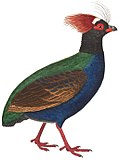Arborophila
| Arborophila | |
|---|---|

| |
| White-necklaced partridge (Arborophila gingica) | |
| Scientific classification | |
| Domain: | Eukaryota |
| Kingdom: | Animalia |
| Phylum: | Chordata |
| Class: | Aves |
| Order: | Galliformes |
| Family: | Phasianidae |
| Subfamily: | Rollulinae |
| Genus: | Arborophila Hodgson, 1837 |
| Type species | |
| Perdix torquela (hill partridge) Valenciennes, 1825
| |
| Species | |
|
About 20, see text | |
Arborophila is a bird genus in the family Phasianidae. The genus has the second most members within the Galliformes after Pternistis, although Arborophila species vary very little in bodily proportions with different species varying only in colouration/patterning and overall size. These are fairly small, often brightly marked partridges found in forest of eastern and southern Asia.[1] Some species in this genus have small ranges, and are threatened by habitat loss and hunting.
Taxonomy
[edit]The genus Arborophila was introduced in 1837 by the English naturalist Brian Houghton Hodgson to accommodate a single species, the hill partridge, which is therefore the type species.[2][3] The genus name combines the Latin arbor, arboris meaning "tree" with the Ancient Greek philos meaning "-loving".[4]
Species
[edit]While most species in this genus are highly distinctive and their taxonomic treatment is settled, there are three complexes where the species limits have not been entirely resolved and to various degrees are disputed: A. orientalis–sumatrana–campbelli–rolli complex, A. cambodiana complex, and A. chloropus–merlini–charltonii complex.[1] A. torqueola is always called the hill partridge or common hill-partridge, but in all other species "hill" is often disregarded (for example, A. rufipectus is variously known as the Sichuan hill-partridge or Sichuan partridge). The genus contains 19 species.[5]
| Image | Common Name | Scientific name | Distribution |
|---|---|---|---|
 |
Hill partridge | Arborophila torqueola | India, Nepal, Bhutan, Tibet, Myanmar, Thailand and Vietnam. |
| Sichuan partridge | Arborophila rufipectus | China | |
 |
Chestnut-breasted partridge | Arborophila mandellii | Bhutan, Darjeeling, Sikkim, Arunachal Pradesh and south-eastern Tibet |
 |
White-necklaced or collared partridge | Arborophila gingica | China (Zhejiang, Jiangxi, Fujian, Guangdong and Guangxi.) |
 |
Rufous-throated partridge | Arborophila rufogularis | Bangladesh, Bhutan, China, India, Laos, Myanmar, Nepal, Thailand, and Vietnam |
 |
Red-billed partridge | Arborophila rubrirostris | Sumatra, Indonesia. |
| Siamese partridge | Arborophila diversa | eastern Thailand. | |
| Chestnut-headed partridge | Arborophila cambodiana | Cambodia. | |
| Hainan partridge | Arborophila ardens | Hainan Island, China. | |
 |
Taiwan partridge | Arborophila crudigularis | Taiwan |
 |
White-cheeked partridge | Arborophila atrogularis | India, northern Myanmar, and northeast Bangladesh |
 |
Bar-backed partridge | Arborophila brunneopectus | Cambodia, China, Laos, Myanmar, Thailand, and Vietnam |
| Orange-necked partridge | Arborophila davidi | Cambodia | |
 |
Red-breasted or Bornean partridge | Arborophila hyperythra | Borneo |
 |
Malayan partridge | Arborophila campbelli | Peninsular Malaysia. |
| Roll's partridge | Arborophila rolli | Sumatra, Indonesia. | |
| Sumatran partridge | Arborophila sumatrana | Sumatra, Indonesia. | |
 |
Chestnut-bellied partridge | Arborophila javanica | Java. |
 |
Grey-breasted or white-faced partridge | Arborophila orientalis | eastern Java, Indonesia. |
References
[edit]- ^ a b Madge, Steve; McGowan, Phil (2002). Pheasants, Partridges & Grouse. London: Christopher Helm. p. 10. ISBN 0-7136-3966-0.
- ^ Hodgson, Brian Houghton (1837). "On two new genera of rasorial birds". Madras Journal of Literature and Science. 5: 300–305 [303].
- ^ Peters, James Lee, ed. (1934). Check-List of Birds of the World. Vol. 2. Cambridge, Massachusetts: Harvard University Press. p. 98.
- ^ Jobling, James A. (2010). The Helm Dictionary of Scientific Bird Names. London: Christopher Helm. p. 53. ISBN 978-1-4081-2501-4.
- ^ Gill, Frank; Donsker, David; Rasmussen, Pamela, eds. (July 2021). "Pheasants, partridges, francolins". IOC World Bird List Version 11.2. International Ornithologists' Union. Retrieved 25 November 2021.
Further reading
[edit]- Chen, D.; Liu, Y; Davison, G.W.H.; Dong, L.; Chang, J.; Gao, S.; Li, S.-H.; Zhang, Z. (2015). "Revival of the genus Tropicoperdix Blyth 1859 (Phasianidae, Aves) using multilocus sequence data". Zoological Journal of the Linnean Society. 175 (2): 429–438. doi:10.1111/zoj.12273.
- Chen, D.; Braun, E.L.; Forthman, M.; Kimball, R.T.; Zhang, Z. (2018). "A simple strategy for recovering ultraconserved elements, exons, and introns from low coverage shotgun sequencing of museum specimens: placement of the partridge genus Tropicoperdix within the Galliformes". Molecular Phylogenetics and Evolution. 129: 304–314. Bibcode:2018MolPE.129..304C. doi:10.1016/j.ympev.2018.09.005. PMID 30201427. S2CID 52181658.




